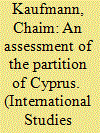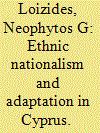|
|
|
Sort Order |
|
|
|
Items / Page
|
|
|
|
|
|
|
| Srl | Item |
| 1 |
ID:
077537


|
|
|
|
|
| Publication |
2007.
|
| Summary/Abstract |
This paper proposes a standard for evaluation of possible solutions to communal conflicts, including partition, based on protection of human life. A partition should be judged successful only if it costs fewer lives than the expected loss of life under any alternative. Solutions to communal conflicts should also be stable over long periods, eliminating or drastically reducing fears of people in the affected communities that they could become victims of renewed violence. An assessment of the 1974 partition of Cyprus is presented, which finds that its net impact on human life remains uncertain-principally because the partition occurred so quickly after the July 1974 coup by Greek Cypriot ultra-nationalists that was the main source of fear of very large-scale ethnic cleansing that we cannot know what the new government might have done. What we can confidently say is that, absent partition, deadly communal violence in Cyprus would have continued to recur and that there are grounds, including the behavior of the July coup regime, for guessing that the ultimate cost would more likely have been higher rather than lower than that of partition. Partition has also enforced peace on Cyprus for 32 years, which may have contributed to the improved climate, compared with 30 or 10 years ago, for eventual reunification
|
|
|
|
|
|
|
|
|
|
|
|
|
|
|
|
| 2 |
ID:
077535


|
|
|
| 3 |
ID:
077533


|
|
|
|
|
| Publication |
2007.
|
| Summary/Abstract |
This article examines U.S. policy in the Persian Gulf and juxtaposes American efforts in Iraq with those in the Gulf Cooperation Council states. As the U.S.-led effort to pacify and democratize Iraq continues to founder and with civil war underway in parts of the country, Washington pursues another imperial strategy in the Persian Gulf better suited to American security preferences and more likely to succeed, at least in the short term. In pursuing an "emirates" strategy, Washington seeks to indulge its historic preference for an informal empire in the Gulf that relies on cooperation with pro-American monarchs. While the Bush administration has touted Iraq's potential to remake the Middle East into a democratic haven, America seems prepared to rely on familiar autocrats to help it tackle terrorists in Southwest Asia and preserve Western access to critical supplies of hydrocarbons should Iraq's democratic rehabilitation prove unsuccessful
|
|
|
|
|
|
|
|
|
|
|
|
|
|
|
|
| 4 |
ID:
077538


|
|
|
|
|
| Publication |
2007.
|
| Summary/Abstract |
This article surveys the history of Cyprus's conflict and partition to derive historical, tactical, and strategic lessons about how the Cyprus problem should be resolved and about the value of partitions more generally. Cyprus is complex. Tensions between North and South are very low, in part because the partition has been a cause of peace. However, both sides remain pervaded by antagonistic and one-sided biases, histories, and myths. Moreover, almost every plausible solution, including the Annan Plan, that proposes to unite the island also incorporates the group-based and gridlock-prone characteristics of the conflict-generating 1960 constitution. A Cyprus solution solves little and creates risks. A better plan to create a permanent peace is to recognize a much smaller North, and bring all sides including Turkey into the European Union. This would create peace, give most Greek Cypriot refugees their land and homes back, and restore all freedoms throughout the island
|
|
|
|
|
|
|
|
|
|
|
|
|
|
|
|
| 5 |
ID:
077536


|
|
|
|
|
| Publication |
2007.
|
| Summary/Abstract |
Supported by the EU and the international community, the extraordinary effort of the UN to mediate a settlement of the Cyprus problem before the integration of Cyprus into the EU ended in failure. The two historical highlights that marked the failure of the peace process were the top level talks at The Hague in March 2003 and the Cyprus referendum in April 2004. The purpose of this paper is to explore the role that the Greek Cypriot and Turkish Cypriot leadership played in derailing the peace effort during these two defining moments in the evolution of the Cyprus problem. The analysis focuses on the polarizing ethno-centric nationalism of the then Turkish Cypriot and Greek Cypriot leaders. But it does so by contrasting the respective nationalism of the leaders to the Europeanizing and peace-enhancing trends that were emerging in Cypriot civil society and Greco-Turkish relations during the crucial period leading to the Hague talks and the Cyprus referendum. From this perspective, the role of the Cypriot leaders during the negotiation process is assessed against the backdrop of Turkey's changed policy on Cyprus and the deepening interethnic rapprochement between the Greek Cypriot and Turkish Cypriot communities, especially following the lifting of restriction to free movement across the green line in April 2003. The investigation attempts to explore how the stubborn sustenance and strategic reactivation of the legacy of adversarial nationalism, as well as the perpetuation of the mono-ethnic concept of statehood by the Cypriot leaders rendered them practically unwilling and ideologically incapable of recognizing and seizing the greatest historical opportunity for peace in Cyprus in half a century.
|
|
|
|
|
|
|
|
|
|
|
|
|
|
|
|
| 6 |
ID:
077534


|
|
|
|
|
| Publication |
2007.
|
| Summary/Abstract |
The role of perception has a significant effect in cases of contemporary peacebuilding. Because the circumstances in which it takes place are highly polarized, groups within the target society tend to be distrustful of change, convinced of their victimization, and suspicious of reforms that do not satisfy the demands of their ethnic, religious, or cultural group. Those factors can lead to resentment against international efforts, especially when reforms require compromise, and a perception that change is externally enforced. A sense of imposition or broken promises can result and spark a local backlash that undermines the legitimacy of reforms and may even result in violence. Because local support is crucial to peacebuilding's success we need to analyze these perceptual challenges more closely. By learning to understand the role of perception in this non-traditional context we may be able to anticipate the cycle of action and response and prevent it from turning to violence.
|
|
|
|
|
|
|
|
|
|
|
|
|
|
|
|
|
|
|
|
|